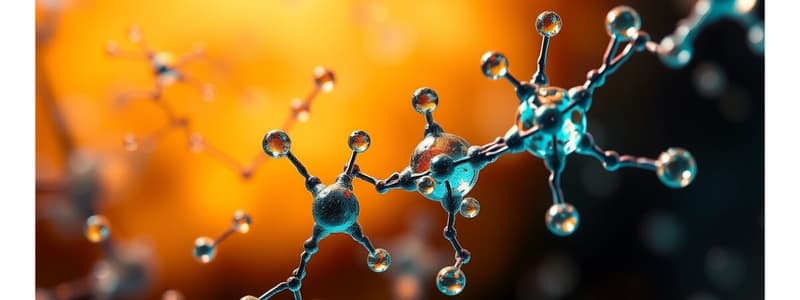Podcast
Questions and Answers
Classify starch as a carbohydrate, protein, lipid, or nucleic acid.
Classify starch as a carbohydrate, protein, lipid, or nucleic acid.
- Carbohydrate (correct)
- Nucleic Acid
- Protein
- Lipid
Classify cholesterol as a carbohydrate, protein, lipid, or nucleic acid.
Classify cholesterol as a carbohydrate, protein, lipid, or nucleic acid.
- Carbohydrate
- Protein
- Lipid (correct)
- Nucleic Acid
Classify steroid as a carbohydrate, protein, lipid, or nucleic acid.
Classify steroid as a carbohydrate, protein, lipid, or nucleic acid.
- Lipid (correct)
- Carbohydrate
- Protein
- Nucleic Acid
Classify glycogen as a carbohydrate, protein, lipid, or nucleic acid.
Classify glycogen as a carbohydrate, protein, lipid, or nucleic acid.
Classify nucleotide as a carbohydrate, protein, lipid, or nucleic acid.
Classify nucleotide as a carbohydrate, protein, lipid, or nucleic acid.
Classify RNA as a carbohydrate, protein, lipid, or nucleic acid.
Classify RNA as a carbohydrate, protein, lipid, or nucleic acid.
Classify polypeptide chain as a carbohydrate, protein, lipid, or nucleic acid.
Classify polypeptide chain as a carbohydrate, protein, lipid, or nucleic acid.
Classify glucose as a carbohydrate, protein, lipid, or nucleic acid.
Classify glucose as a carbohydrate, protein, lipid, or nucleic acid.
Classify unsaturated fatty acid as a carbohydrate, protein, lipid, or nucleic acid.
Classify unsaturated fatty acid as a carbohydrate, protein, lipid, or nucleic acid.
Classify polysaccharide as a carbohydrate, protein, lipid, or nucleic acid.
Classify polysaccharide as a carbohydrate, protein, lipid, or nucleic acid.
Classify phospholipid as a carbohydrate, protein, lipid, or nucleic acid.
Classify phospholipid as a carbohydrate, protein, lipid, or nucleic acid.
Classify glycerol as a carbohydrate, protein, lipid, or nucleic acid.
Classify glycerol as a carbohydrate, protein, lipid, or nucleic acid.
Classify monosaccharide as a carbohydrate, protein, lipid, or nucleic acid.
Classify monosaccharide as a carbohydrate, protein, lipid, or nucleic acid.
Classify cellulose as a carbohydrate, protein, lipid, or nucleic acid.
Classify cellulose as a carbohydrate, protein, lipid, or nucleic acid.
Classify amino acid as a carbohydrate, protein, lipid, or nucleic acid.
Classify amino acid as a carbohydrate, protein, lipid, or nucleic acid.
Classify enzyme as a carbohydrate, protein, lipid, or nucleic acid.
Classify enzyme as a carbohydrate, protein, lipid, or nucleic acid.
Classify saturated fat as a carbohydrate, protein, lipid, or nucleic acid.
Classify saturated fat as a carbohydrate, protein, lipid, or nucleic acid.
Classify DNA as a carbohydrate, protein, lipid, or nucleic acid.
Classify DNA as a carbohydrate, protein, lipid, or nucleic acid.
What do saturated fats provide for animals?
What do saturated fats provide for animals?
What does RNA provide for the body?
What does RNA provide for the body?
What do monosaccharides/glucose provide for plants?
What do monosaccharides/glucose provide for plants?
What are steroids involved in?
What are steroids involved in?
What role do phospholipids play in the cell?
What role do phospholipids play in the cell?
What is the function of enzymes?
What is the function of enzymes?
What is the monomer of proteins?
What is the monomer of proteins?
What do starches provide for plants?
What do starches provide for plants?
What is DNA considered?
What is DNA considered?
What role does cholesterol play in cells?
What role does cholesterol play in cells?
What is glycerol in relation to fats?
What is glycerol in relation to fats?
What does glycogen provide for animals?
What does glycogen provide for animals?
What are polysaccharides made of?
What are polysaccharides made of?
What is nucleotide in relation to nucleic acids?
What is nucleotide in relation to nucleic acids?
What is cellulose's role in plants?
What is cellulose's role in plants?
Which specific molecule are almonds mostly made of? (saturated fat, unsaturated fat, protein, glucose, starch, cellulose)
Which specific molecule are almonds mostly made of? (saturated fat, unsaturated fat, protein, glucose, starch, cellulose)
Which specific molecule is spinach mostly made of? (saturated fat, unsaturated fat, protein, glucose, starch, cellulose)
Which specific molecule is spinach mostly made of? (saturated fat, unsaturated fat, protein, glucose, starch, cellulose)
Which specific molecule is beef jerky mostly made of? (saturated fat, unsaturated fat, protein, glucose, starch, cellulose)
Which specific molecule is beef jerky mostly made of? (saturated fat, unsaturated fat, protein, glucose, starch, cellulose)
Which specific molecule is bacon mostly made of? (saturated fat, unsaturated fat, protein, glucose, starch, cellulose)
Which specific molecule is bacon mostly made of? (saturated fat, unsaturated fat, protein, glucose, starch, cellulose)
Flashcards are hidden until you start studying
Study Notes
Macromolecules Overview
-
Carbohydrates: Include starch, glycogen, glucose, and cellulose.
- Starch: Polysaccharide, provides long-term energy storage for plants.
- Glycogen: Short-term energy storage, found only in liver and muscle cells.
- Glucose: Simple sugar, offers immediate energy, converts to ATP in cells.
- Cellulose: Forms cell walls in plants, a type of fiber.
-
Proteins: Composed of amino acids and polypeptides.
- Amino Acid: Monomers of proteins, essential for protein synthesis.
- Enzyme: Speeds up chemical reactions by lowering activation energy; crucial for metabolic processes.
-
Lipids: Include cholesterol, steroids, phospholipids, and fatty acids.
- Cholesterol: Vital component of cell membranes, type of steroid.
- Steroid: Includes sex hormones and all hormonal compounds.
- Phospholipid: Forms cellular membranes, both in plants and animals.
- Unsaturated Fatty Acid: Found in plants, beneficial for health.
- Saturated Fat: Found in animal products, provides long-term energy storage.
-
Nucleic Acids: Composed of nucleotides, includes DNA and RNA.
- Nucleotide: Monomer unit for nucleic acids.
- DNA: Genetic material, essential for heredity.
- RNA: Carries instructions for protein synthesis.
Key Concepts
- Monosaccharides: Simple sugars; significant for energy supply.
- Polysaccharides: Formed when multiple sugars combine; vital for energy storage.
- Protein Structure: Polypeptides form complex three-dimensional structures.
- Fatty Acids: Building blocks of lipids; categorized into saturated and unsaturated types.
- Energy Storage: Different macromolecules provide various forms of energy storage for organisms.
- Plant vs Animal Products: Distinction in macromolecules; plants predominantly feature cellulose, while animal products include proteins and saturated fats.
Studying That Suits You
Use AI to generate personalized quizzes and flashcards to suit your learning preferences.




